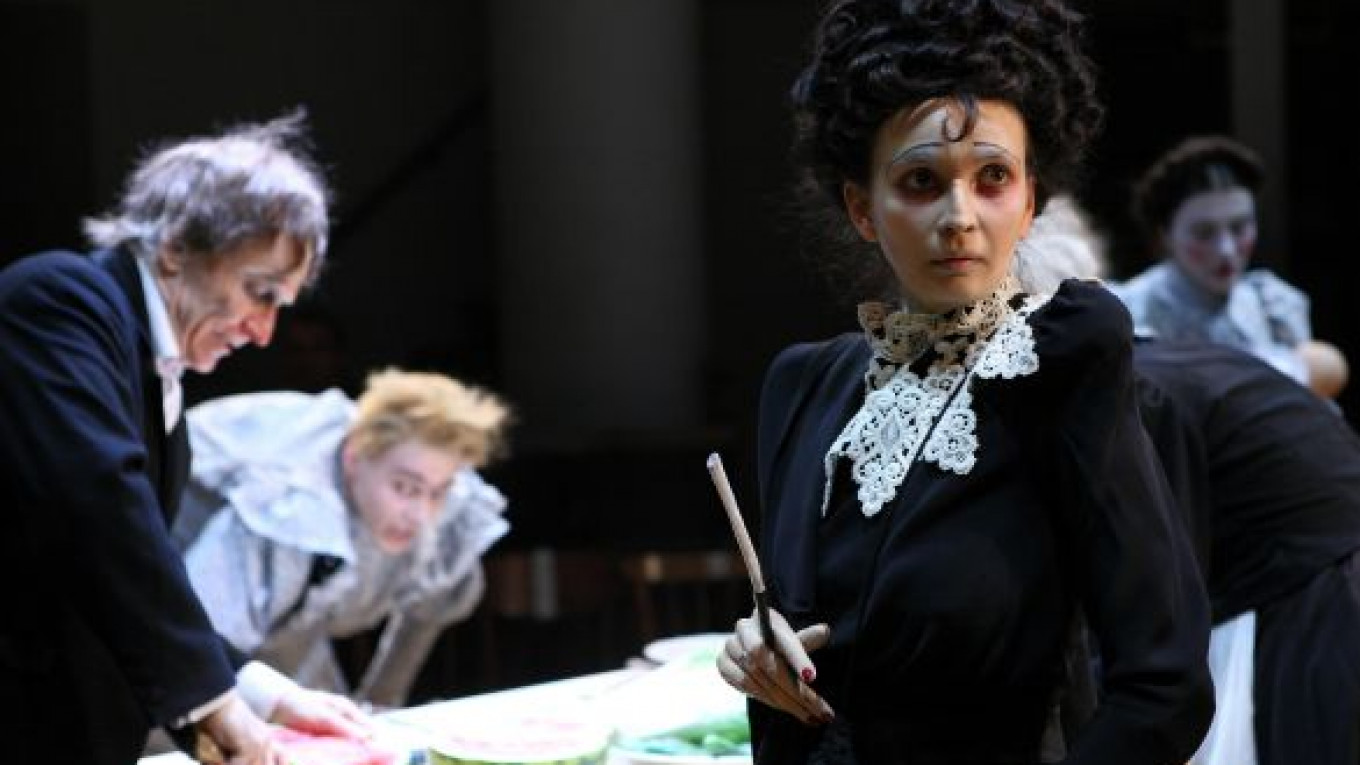It must be magic. How else do you explain it?
Dmitry Krymov's latest production at the School of Dramatic Art does what most of his productions do — it amazes. But also like everything he does, it amazes in unexpected ways.
"Honore de Balzac: Notes About Berdichev" plumbs Krymov's favorite territory: the plays of Anton Chekhov. In "Auction" and "Tararabumbiya" he pulled snippets from the Chekhov canon and created his own resonant tales of loss and love. "Balzac," referencing a phrase Doctor Chebutykin utters about the French writer getting married in the provincial city of Berdichev, takes on "Three Sisters."
This show pulls scenes out of Chekhov's context and places them in a new one, with additional dialogue presumably worked out by the actors during rehearsals. These three sisters no longer think much about going to Moscow. Like everyone around them, they struggle to remember who they are and what they are doing in the present moment.
But this is not merely "Three Sisters" deconstructed. It is "Three Sisters" in serious decay. Krymov and makeup designer Tatyana Shmykova imagined Chekhov's characters as if they all just stood from their coffins, brushed off the dirt, and went back to the same old trials and tribulations.
The dashing Vershinin (Mikhail Umanets), with an ugly gash across his face, is missing his left arm at the shoulder. The middle sister Masha (Maria Smolnikova), whom he sort of falls in love with, looks suspiciously like Mortitia from "The Addams Family." Masha's long-suffering husband Kulygin (Arkady Kirichenko) continues that tentative echo with a monstrous forehead a la Lurch.
These characters, apparently, have been alive so long that they are beyond dead and have found new lives as mutants.
As unexpected as it may be, this is not what amazes so much in Krymov's oddly beautiful, funny and moving production. What struck me more than anything was the fragile, almost hesitant, tempo of the performance. As though Krymov backed away from trying to put too many finishing touches on his work.
Yes, there are the requisite bold strokes that grab laughter and attention. Dead birds — puppets — flying in from the skies. A live rooster fluttering at mid-stage. A hilarious three-way fight among the sisters, who take out their lifelong frustrations with each other in a kicking, scratching, screeching wrestling match.
But more often, Krymov holds back on the big gestures. He lets conversations hang and allows scenes to roll slowly to a stop. There is a thoughtfulness and a deep sadness about this show that comes about in part thanks to its lack of dynamic development. It has the feel of life.
One of many powerful moments occurs near the end as the actors sit in a circle and remove their masks, makeup and costumes. They are, it would seem, merely actors backstage, discussing a hard night's work.
But appearances are deceiving. Maxim Maminov, playing Baron von Tuzenbach, who dies in a duel with his rival Solyony, takes a sip of coffee and the liquid spurts out a hole in his breast. He slumps over dead in his chair. Irina (Kristina Pivneva), his fiancee, not noticing his death, caresses his head gently and talks of how they will work and live.
It is a devastating, lightning flash moment, a reminder how so often we do the important things in life when it is way too late.
"Balzac" is filled with memorable performances, but Alexander Anurov's Chebutykin, a doctor who cannot remember how to heal, stands alone. He is corrosively funny, from his first appearance in a blood-spattered medical frock, to the moving scene of him deliberately smashing a huge clock that once belonged to the sisters' mother.
Designer Vera Martynova sets half of the action on the floor surrounded by spectators, the other half on a bare, steeply raked plywood stage.
"Honore de Balzac: Notes About Berdichev" is baffling and dazzling. What is Marlene Dietrich doing here? Why does Protopopov speak Italian? What did Gogol's statue whisper in Masha's ear? How do those coffee cups move back and forth on the table?
Magic. It is magic. See it and find out for yourself.
"Honore de Balzac: Notes About Berdichev" (Onore de Balzak: Zametki o Berdicheve) plays Nov. 21, 22, 23 and 24 at 7 p.m. at the School of Dramatic Art, 19 Sretenka Ulitsa. metro Sukharevskaya. Tel. 495-632-9344. sdart.ru. Running time: 2 hours, 10 minutes.
Contact the author at j.freedman@imedia.ru
A Message from The Moscow Times:
Dear readers,
We are facing unprecedented challenges. Russia's Prosecutor General's Office has designated The Moscow Times as an "undesirable" organization, criminalizing our work and putting our staff at risk of prosecution. This follows our earlier unjust labeling as a "foreign agent."
These actions are direct attempts to silence independent journalism in Russia. The authorities claim our work "discredits the decisions of the Russian leadership." We see things differently: we strive to provide accurate, unbiased reporting on Russia.
We, the journalists of The Moscow Times, refuse to be silenced. But to continue our work, we need your help.
Your support, no matter how small, makes a world of difference. If you can, please support us monthly starting from just $2. It's quick to set up, and every contribution makes a significant impact.
By supporting The Moscow Times, you're defending open, independent journalism in the face of repression. Thank you for standing with us.
Remind me later.







